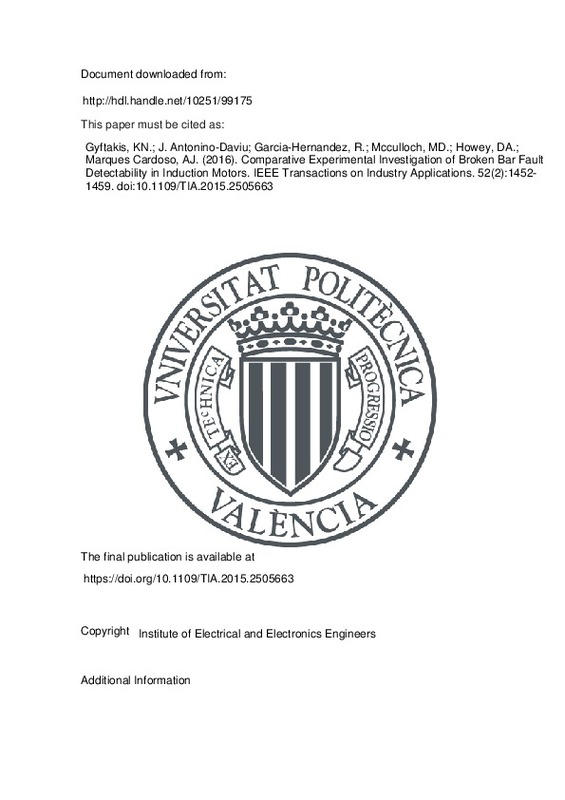JavaScript is disabled for your browser. Some features of this site may not work without it.
Buscar en RiuNet
Listar
Mi cuenta
Estadísticas
Ayuda RiuNet
Admin. UPV
Comparative Experimental Investigation of Broken Bar Fault Detectability in Induction Motors
Mostrar el registro sencillo del ítem
Ficheros en el ítem
| dc.contributor.author | Gyftakis, Konstantinos N.
|
es_ES |
| dc.contributor.author | Antonino-Daviu, J.
|
es_ES |
| dc.contributor.author | Garcia-Hernandez, Raul
|
es_ES |
| dc.contributor.author | McCulloch, Malcolm D.
|
es_ES |
| dc.contributor.author | Howey, David A.
|
es_ES |
| dc.contributor.author | Marques Cardoso, Antonio J.
|
es_ES |
| dc.date.accessioned | 2018-03-12T05:23:37Z | |
| dc.date.available | 2018-03-12T05:23:37Z | |
| dc.date.issued | 2016 | es_ES |
| dc.identifier.issn | 0093-9994 | es_ES |
| dc.identifier.uri | http://hdl.handle.net/10251/99175 | |
| dc.description.abstract | [EN] It has been shown in the past that the zero-sequence current spectrum can be reliably used to detect broken bar faults in induction motors. Previous work was carried out with extensive FEM analysis. Although it allows detailed study of spatial and time-dependent electromagnetic characteristics of induction motors, FEM is a heavily time-consuming tool and this limits full study. So, in this work, extensive experimental testing has been performed to validate the zero sequence current spectrum for detecting rotor asymmetries. Three identical induction motors have been used: one healthy, one with a broken rotor bar, and one with two broken rotor bars. The motors were tested under different voltage supply levels and with different mechanical loads. The zero-sequence current spectrum was calculated after measuring the three phase currents. It is for the first time experimentally shown that this approach offers greater diagnostic potential than traditional MCSA. | es_ES |
| dc.description.sponsorship | This work was supported in part by the U.K. Engineering and Physical Sciences Research Council funded FUTURE Vehicles project (EP/I038586/1). | es_ES |
| dc.language | Inglés | es_ES |
| dc.publisher | Institute of Electrical and Electronics Engineers | es_ES |
| dc.relation.ispartof | IEEE Transactions on Industry Applications | es_ES |
| dc.rights | Reserva de todos los derechos | es_ES |
| dc.subject | Broken rotor bar | es_ES |
| dc.subject | Fault diagnosis | es_ES |
| dc.subject | Induction motor | es_ES |
| dc.subject | Zero-sequence current | es_ES |
| dc.subject.classification | INGENIERIA ELECTRICA | es_ES |
| dc.title | Comparative Experimental Investigation of Broken Bar Fault Detectability in Induction Motors | es_ES |
| dc.type | Artículo | es_ES |
| dc.identifier.doi | 10.1109/TIA.2015.2505663 | es_ES |
| dc.relation.projectID | info:eu-repo/grantAgreement/UKRI//EP%2FI038586%2F1/GB/Developing FUTURE Vehicles (Fundamental Understanding of Technologies for Ultra Reduced Emission Vehicles)/ | es_ES |
| dc.rights.accessRights | Abierto | es_ES |
| dc.contributor.affiliation | Universitat Politècnica de València. Departamento de Ingeniería Eléctrica - Departament d'Enginyeria Elèctrica | es_ES |
| dc.description.bibliographicCitation | Gyftakis, KN.; Antonino-Daviu, J.; Garcia-Hernandez, R.; Mcculloch, MD.; Howey, DA.; Marques Cardoso, AJ. (2016). Comparative Experimental Investigation of Broken Bar Fault Detectability in Induction Motors. IEEE Transactions on Industry Applications. 52(2):1452-1459. doi:10.1109/TIA.2015.2505663 | es_ES |
| dc.description.accrualMethod | S | es_ES |
| dc.relation.publisherversion | https://doi.org/10.1109/TIA.2015.2505663 | es_ES |
| dc.description.upvformatpinicio | 1452 | es_ES |
| dc.description.upvformatpfin | 1459 | es_ES |
| dc.type.version | info:eu-repo/semantics/publishedVersion | es_ES |
| dc.description.volume | 52 | es_ES |
| dc.description.issue | 2 | es_ES |
| dc.relation.pasarela | S\315274 | es_ES |
| dc.contributor.funder | Engineering and Physical Sciences Research Council, Reino Unido | |
| dc.contributor.funder | UK Research and Innovation | es_ES |







![[Cerrado]](/themes/UPV/images/candado.png)

